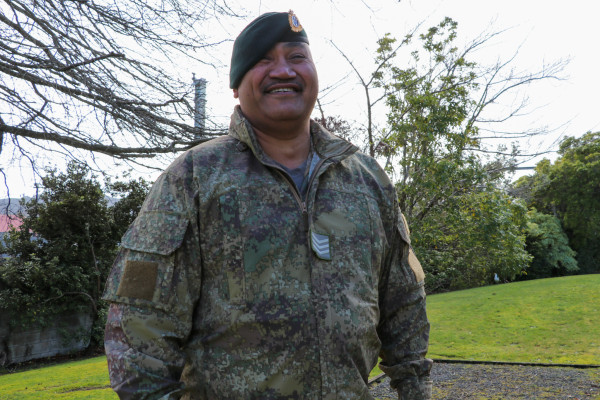Giving back to his Army — Sergeant Derek Kupe
Sergeant Derek Kupe (Te Ati Awa, Ngāruahine O Te Rangi) first joined the New Zealand Army in 1984 aged 17. He left the Army in 1995, returned in 1997, and left again in 2007.
He initially joined to get away from a stagnant environment and returned because of the variety of service.
“I’ve been out in Civilian Street, and everything day-to-day is same-old same-old, whereas in the Army one minute you’re on exercise and then you’re coming off exercise and going operational. It’s like being in a whole new world at times.”
After nearly 12 years as a civilian doing various jobs, including building helicopters, he returned to the Army again in 2018.
“Mediocracy is easy to achieve, the services never work to just being mediocre,” he says.
“The military gave me 20-plus years’ worth of really, really good times. This time it’s my turn to pay back the military. I’m here solely because I feel that it’s my turn to help the military out again for what they have given me.”
Derek stopped speaking te reo Māori before he joined the Army back in 1984 but is now re-learning as an adult.
“I’m only just getting back to my roots and learning it again. It’s something that I want to do, but I want to do it in my own time.”
Between 2004 and 2007 Derek was posted to Waiouru and visited Rongomaraeroa-o-nga-hau e wha Marae with new recruits.
“Being on the marae, even though it was more about te reo, it was also about a journey for any type of nationality, that we will accept you as part of the New Zealand whānau.”

Sergeant Derek Kupe
In 1999 Derek deployed to what is now Timor-Leste as part of International Force East Timor. His unit had finished service as part of the Asia-Pacific Economic Forum conference in Auckland and had to start preparing all the supplies for the deployment as soon as they arrived at Linton Camp.
Derek was with the 2nd Signal Squadron and they had to prepare all the communications equipment for the deployment. He and his fellow soldiers worked overtime in order to get the work done.
“At the end of it when we mounted and left there was a sense of ‘wow, we didn’t think we could do it, but we did’. If that doesn’t give you a sense of pride nothing will.”
New Zealand Defence Force personnel deployed to Timor-Leste in late September 1999 and Derek’s squadron was based in Suai, where 200 Timorese were murdered in the Suai Church Massacre on 6 September 1999. It was one of the worst single acts of violence during the post-referendum violence.
Derek served as a supply technician as a Corporal and then stepped up to Store Sergeant. Suai was hot, busy, and an eye-opener for Derek who served in a battalion environment for the first time.
“I got taken from a very small store and moved into a battalion environment. Within the battalion, you had a wider scope of equipment so you had to learn a lot more much faster.”
His role as a soldier is something that he takes with him when he leaves camp at the end of each day.
“When I see fellow service members I feel an intense sense of pride. You can always tell soldiers by how they move around – they have that pride, they have that confidence. It’s a gift that we give each other.”
Derek’s wife Julie also served in the Army and deployed to Timor-Leste, the Sinai, and the Pacific during her service. They have been married for more than 30 years and they have two sons. He credits the Army with changing his life.
“I would not be anywhere near the person I am now without that service to the military. So I am very loyal to what I like to consider ‘my Army’.”